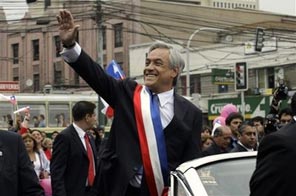Pinera works late, promises better dawn for Chile
SANTIAGO: Calling on Chileans to dry their tears and get to work to rebuild the nation, Sebastian Pinera is already setting an example.
Meeting late into the night with his ministers after a day when repeated earthquakes shook up inaugural ceremonies, the new president vowed "to work without rest" on relief and reconstruction, introducing his first proposals to the congress Friday morning.
Pinera promised that Chileans could sleep soundly, confident "a government team will be working so you and your children can have a better dawn."
The emergency bill would create subsidies and tax-deductible donations and provide one-time cash handouts of $76 each to 4.2 million survivors in need, he said. Pinera's staff already has been lobbying opposition lawmakers for the package, and Congress prepared to move quickly.
Pinera repeatedly urged Chileans to display courage in his first appearances as president. But Thursday's swarm of aftershocks — including several capable of generating tsunamis and one nearly as big as the quake that devastated Haiti — persuaded many to run for the hills and stay there.
The temblors also caused worry during the inaugural ceremonies inside Chile's congress in coastal Valparaiso, rocking a massive light fixture that many in the audience of 2,000 worried would come crashing down on presidents and dignitaries. Colombia's Alvaro Uribe briefly walked out during one of the aftershocks, while outgoing President Michelle Bachelet seemed unperturbed even as a nearby flower arrangement rocked back and forth.
Then the 60-year-old Pinera strode in smiling, and a steely calm prevailed until oaths were sworn and the audience headed for the hills, joining a crowd outside that was already evacuating, following the navy's tsunami warning.
The roller coaster of an Inauguration Day, with more than a dozen significant aftershocks rocking central Chile, amply demonstrated Pinera's challenges after last month's magnitude-8.8 quake, one of the biggest in modern history.
Chile's first elected right-wing president in 52 years now promises to be the "reconstruction president."
"Let's dry our tears and put our hands to work," he said. "I am sure that just as we have done so many times, the Chilean people will rise up to this challenge."
But Thursday's quakes terrified many who have been living in and around weakened homes. Tall buildings swayed and windows rattled in downtown Santiago. In Talca, supermarkets closed for fear of looting. And just outside coastal Constitucion, survivors and volunteers building 60 emergency shelters fled uphill in panic.
There were no reports of more deaths, but violent waves hit the coastal towns of Pichilemu and Bucalemu, Interior Minister Rodrigo Hinzpeter said.
The Feb. 27 earthquake — the fifth-strongest since 1900 — killed 497 identified victims and potentially hundreds of others, destroyed or heavily damaged at least 500,000 homes and broke apart highways and hospitals. Recovery costs could soar above $15 billion, including $5 billion for infrastructure alone.
Chile's navy and emergency management office were much criticized for failing to issue a tsunami alert that might have saved hundreds of lives from the towering waves that followed the initial quake. This time, the alert went out — Pinera said an overabundance of caution was called for.
"Everything stopped — my meetings with business owners, work, life, everything has been paralyzed," said Mayor Gaston Saavedra of Talcahuano, where waves shoved huge shipping containers into downtown buildings last month.
In Constitucion, Pinera left 130 flowers along the riverbank for the dead and missing, and announced that his government would provide a "March bonus" for disaster survivors.
Speaking later from the balcony of the presidential palace in Santiago, Pinera invoked the fierce spirit of Bruno Sandoval, a man in coastal Pelluhue who was captured in an iconic Associated Press photo pulling a dirty and torn Chilean flag from tsunami wreckage.
"He also was lifting the spirit of a country," Pinera said. "Because in a certain way we are all survivors of this tragedy. Each man, each woman, child or young person from this land is a flag recovered from the ruins, that could be ripped or muddied by pain and suffering, but will never be brought down."
Pinera had vowed to spend billions to make Chile "the best country in the world," accelerating economic growth, creating 1 million jobs and combatting crime while maintaining popular social programs that gave Bachelet 84 percent approval ratings.
His victory ended 20 years of center-left governments that followed Gen. Augusto Pinochet's dictatorship, and put Chile's business elite squarely back in power. But he lacks a legislative majority, and reconstruction will be very expensive.






